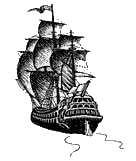
 |
The Golden Age |


Many pirates, particularly English pirates would not attack ship belonging to England. Their stated reasons were that they would never attack a British ship out of respect for the king or queen or because they were not at war with England,or they were pirates but not traitors. Their main reason, of course, was that they hoped that by not attack British ships they would be given safe harbor or passage from the British. Sometimes it worked and sometimes it didn't.
| During the 1600's, a group of runaway men (slaves), criminals and refugees were living in the Caribbean. Mainly Dutch, English and French, they hated the Spanish, who ruled much of the Caribbean at that time. They enjoyed attacking the Spanish ships and did so whenever they could. |

During times of war, some governments would commission privateers to seek out and attack the ships of hostile nations. This was especially true of England. In this case, the Privateers would sail "on the account". That is they would loot, pillage, and plunder England's enemies for King and Country.For their efforts the Captain and crew would receive a portion of the plunder, between 1/5 and 1/2 the rest going to the crown. In return the Captain and crew had safe harbor and was protected by England. Henry Morgan was a privateer.
Privateers often worked beyond the limits as detailed by their letter of Marque, often attacking neutral countries as well as hostile nations. Rarely would privateers attack their own country's ships. This would have been an act of high treason.
Countries would often complain about the actions of privateers but most of the time England would ignore the complaints unless they were in the middle of delicate negotiations, in which case the head of privateer may have proven a small payment for what could be a large and generous reward.